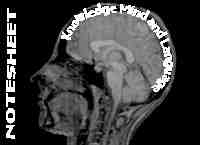
THE KNOWLEDGE ARGUMENT.
Scenario 1: Fred
Fred is a person who sees an extra colour compared with the rest of us.
Scenario 2: Mary
Mary is a scientist who works in a black and white room with a b&w monitor
THE MODAL ARGUMENT.
This argument takes as its premise the proposition that no amount of physical
information about a person logically entails that he or she is conscious or
'feels' something or is 'aware'.
But if that has to be accepted, what can be shown to follow?
Simply that these two worlds are profoundly different, and that something is
clearly missing from the other one.
What is missing? We know it isn't anything physical - the two worlds are physically
identical. It must be something other than physical. Ergo, there is something
more than physical to human beings.
But: 'Some sincerely deny that there can be physical replicas of us in other possible worlds which nevertheless lack consciousness.' Jackson, in Lycan, p.472.
THE 'WHAT IS IT LIKE TO BE A BAT' ARGUMENT.
This (due to Thomas Nagel) attempts to undermine physicalism on the basis that where you have awareness there is a 'point of view', something that it is like to be that aware thing - eg this human being , or a bat. Because bat life is so different from ours it is especially clear in the case of a bat that we cannot hope to know what it is like to be one. Jackson says it isn't the knowledge argument, and isn't cogent.
EPIPHENOMENALISM DEFENDED
Three arguments in favour rejected:
1. 'The causal connection is obvious'
2. The Darwinian objection.
3. The problem of inferring to other minds.
But: 'The epiphenomenalist can argue from the behaviour of others back to its
causes in the brains of others and out again to their qualia.' Jackson, in Lycan,
p.475.